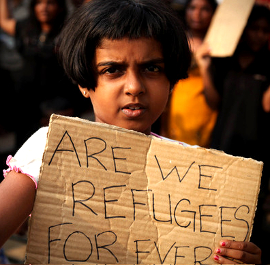Human rights repressed in partisan pressing
 In the war between Attorney-General George Brandis, Immigration Minister Peter Dutton and Human Rights Commission president Gillian Triggs, it is difficult to know who should explain themselves.
In the war between Attorney-General George Brandis, Immigration Minister Peter Dutton and Human Rights Commission president Gillian Triggs, it is difficult to know who should explain themselves.
The Federal ministers issued an extraordinary statement last Friday, calling on Prof Triggs to “explain her comments” linking Australia’s turn-back policy and negotiations with Indonesia about the death penalty.
But Brandis, the nation’s first law officer, has been called on the explain why he is so opposed to Prof Triggs’ proposition – correct or not – given that she is perfectly entitled to make it.
Meanwhile, critics of Mr Dutton say his attack on a respected figure in the legal community shows that he is not legal-minded enough to be given the ability to decide on peoples’ citizenship, for example.
The statement that kicked off the latest round of the fight was delivered in response to a question at a Committee for Economic Development of Australia (CEDA) last week.
Professor Triggs said: “Boats have got to stop. But have we thought about what the consequences are of pushing people back to our neighbour Indonesia? Is it any wonder that Indonesia will not engage with us on other issues that we care about, like the death penalty?”
The led media outlets like The Australian to run headlines like; “Deaths of Bali duo ‘linked to boats’”.
The two federal ministers have followed the line laid out by News Corp media outlets.
“Her comments on the execution of Andrew Chan and Myuran Sukumaran are poorly informed and foolish,” the statement from Dutton and Brandis says.
“They will also be offensive to Indonesia by implying, as they do, that Indonesia’s decision to execute two Australians was influenced by international considerations.”
Triggs has defended herself in a statement, saying; “I was making the observation that any solution to the movement of asylum seekers and refugees in our region should be by diplomatic negotiation.”
“At no time did I refer to the recent executions of the two young Australians. Rather I spoke of the future need to work diplomatically to reach agreement on ending the death penalty in the region. This reflected my early public commentary on the need for a moratorium on the death penalty.”
The ministers’ statement contradictorily called for Triggs to stay out of political issues, while also providing suggestions on them.
“As a lawyer, she knows better than to assert conclusions in the absence of evidence. Her comments were not in defence of human rights, but a gratuitous intervention in a difficult political issue,” the statement said.
“Although she says the ‘Boats have got to stop', she offers no suggestions as to how that might be done.”
It is difficult to imagine why Prof Triggs would seek to make new suggestions to the Government, given its vociferous reaction to even veiled recommendations so far.
News Corp reporters point to Prof Triggs’ failings at hearings about reports on conditions in offshore detention as evidence that she should resign.
The main point of contention is the 18-month gap between Triggs deciding that an inquiry into the detention conditions was necessary, and the release of the final report.
A federal election happened in the meantime, leading to loud cries of partisanship.
“She said it would be ‘very destructive’ to hold the inquiry close to an election... with such open reference to political considerations, Triggs was asked if she had discussed the possibility of the inquiry with any Labor ministers,” Paul Kenny writes in The Australian.
“She said she had not... later, under sustained questioning she changed her account and said she had discussed the inquiry on separate occasions with both [Chris] Bowen when he was immigration minister and [Tony] Burke when he took over.”
The Herald Sun’s Andrew Bolt was particularly scathing.
“Worse, her entire commission, given $25 million a year to be our moral policeman, is now widely regarded as just a bunch of Leftist activists of no more account than a Julian Burnside,” Bolt writes.
“The Government believes Triggs is so discredited that it no longer has to even pretend to respect her. It certainly won’t listen to her.”
Michelle Grattan, Professorial Fellow at University of Canberra and former Fairfax journalist, has summed-up the stoush.
“The Ministers seem to have gone on a headline, and then thought they could get away with bullying and insulting in the most extreme terms, as is too often the method of this government,” she wrote in an article for The Conversation.
“The media cycle being what it is, the attack becomes the story, especially when there is plenty of actuality from Dutton’s press conference.”








 Print
Print